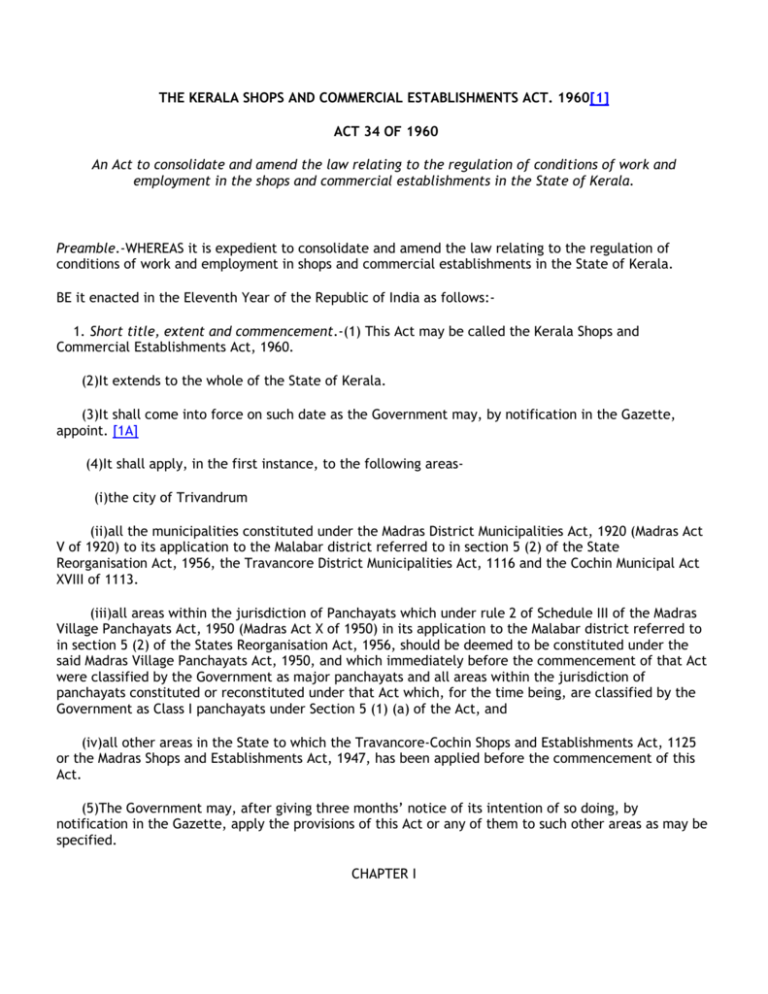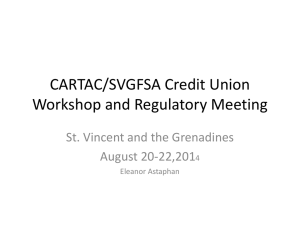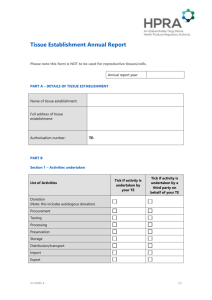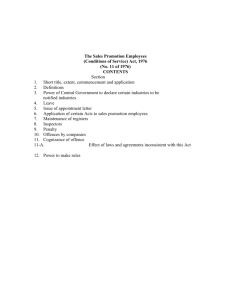the kerala shops and commercial establishments act
advertisement

THE KERALA SHOPS AND COMMERCIAL ESTABLISHMENTS ACT. 1960[1] ACT 34 OF 1960 An Act to consolidate and amend the law relating to the regulation of conditions of work and employment in the shops and commercial establishments in the State of Kerala. Preamble.-WHEREAS it is expedient to consolidate and amend the law relating to the regulation of conditions of work and employment in shops and commercial establishments in the State of Kerala. BE it enacted in the Eleventh Year of the Republic of India as follows:1. Short title, extent and commencement.-(1) This Act may be called the Kerala Shops and Commercial Establishments Act, 1960. (2)It extends to the whole of the State of Kerala. (3)It shall come into force on such date as the Government may, by notification in the Gazette, appoint. [1A] (4)It shall apply, in the first instance, to the following areas(i)the city of Trivandrum (ii)all the municipalities constituted under the Madras District Municipalities Act, 1920 (Madras Act V of 1920) to its application to the Malabar district referred to in section 5 (2) of the State Reorganisation Act, 1956, the Travancore District Municipalities Act, 1116 and the Cochin Municipal Act XVIII of 1113. (iii)all areas within the jurisdiction of Panchayats which under rule 2 of Schedule III of the Madras Village Panchayats Act, 1950 (Madras Act X of 1950) in its application to the Malabar district referred to in section 5 (2) of the States Reorganisation Act, 1956, should be deemed to be constituted under the said Madras Village Panchayats Act, 1950, and which immediately before the commencement of that Act were classified by the Government as major panchayats and all areas within the jurisdiction of panchayats constituted or reconstituted under that Act which, for the time being, are classified by the Government as Class I panchayats under Section 5 (1) (a) of the Act, and (iv)all other areas in the State to which the Travancore-Cochin Shops and Establishments Act, 1125 or the Madras Shops and Establishments Act, 1947, has been applied before the commencement of this Act. (5)The Government may, after giving three months’ notice of its intention of so doing, by notification in the Gazette, apply the provisions of this Act or any of them to such other areas as may be specified. CHAPTER I PRELIMINARY 2.Definitions.-In this Act, unless the context otherwise requires.(1)“apprentice” means a person, aged not less than twelve years, whom an employer employs in his service for training by himself or by any other person for any trade or calling: (2)“child” means a person who has not completed his fourteenth year; (3)“closed” means not open for the service of any customer or open to any business connected with the establishment; (4)“commercial establishment” means a commercial or industrial or trading or banking or insurance establishment, an establishment or administrative service in which the persons employed are mainly engaged in office work, hotel, restaurant, boarding or eating house, café or any other refreshment house, a theatre or any other place of public amusement or entertainment and includes such other establishment as the Government may, by notification in the Gazette, declare to be a commercial establishment for the purposes of this Act, but does not include a factory to which all or any of the provisions of the Factories Act, 1948 (Central Act 63 of 1948) apply; (5)“day” means the period of twenty-four hours beginning at mid-night; Provided that in the case of an employee whose hours of work extend beyond mid-night, day means the period of twenty-four hours beginning when such employment commences; (6)“employee” means a person wholly or principally employed in, and in connection with, any establishment and includes an apprentices; (7)“employer” means a person owning, or having ultimate control over the affairs of, an establishment and includes the manager, agent or other person acting in the general management or control of an establishment; (8)“establishment” means a shop or a commercial establishment; (9)“inspector” means an Inspector appointed under this Act; (10)“leave” means leave provided for in Chapter III of this Act: (11)“opened” means opened for the service of any customer or to any business connected with the establishment; (12)“period of work” means the time during which an employee is at the disposal of the employer; (13)“prescribed ” means prescribed by rules made under this Act; (14)“prescribed authority” means the authority prescribed by rules made under this Act; (15)“shop” means any premises where any trade or business is carried on or where services are rendered to customers, and includes offices, store-rooms, godowns or warehouses, whether in the same premises or otherwise, used in connection with such trade or business but does not include a commercial establishment or a shop attached to a factory where the persons employed in the shop are allowed the benefits provided for workers under the Factories Act, 1948 (Central Act 63 of 1948); (16)“spread over” means the period between the commencement and the termination of the work of an employee on any day; (17)“week” means the period of seven days beginning at mid-night on Saturday night or such other night as may be approved in writing for a particular area by the prescribed authority; (18)“year” means a year commencing on the first day of January. 3.Exemptions.-(1) Nothing contained in this Act shall apply to(a)persons employed in any establishment in a position of management; (b)persons whose work mainly involves traveling, and persons employed as canvassers and caretakers and whose names do not appear in the muster rolls; (c)establishments under the Central or any State Government, local authorities, the Reserve Bank of India and cantonment authorities; (d)establishment in mines and oil fields; (e)establishments in bazaars in places where fairs or festivals are held temporarily for a period not exceeding fifteen days at a time; (f)establishments which, not being factories within the meaning of the Factories Act, 1948 (Central Act 63 of 1948) are in respect of matters dealt with in this Act, governed by a separate law for the time being in force in the State of Kerala. 2.Nothing contained in section 10 shall apply to— (a)hospitals and other institutions for the treatment or care of the sick, the infirm, the destitute or the mentally unfit; (b)such chemists’ or druggists’ shops, as the Government may, by general or special order, specify; (c)clubs and residential hotels, hostels attached to schools or colleges, and establishments maintained in boarding schools, in connection with the boarding and loading of pupils and resident masters; (d)stalls and refreshment rooms at railway stations docks, wharves or ports. 4.Power of Government to apply Act to exempted persons or establishments.—Notwithstanding anything contained in section 3, the Government may, by notification in the Gazette, apply all or any of the provisions of this Act to any class of persons or establishments mentioned in that section, other than those mentioned in clauses ( ) and (f) of sub-section (1) and modify or cancel any such notification. 5.Exemptions.-The Government may, if they are satisfied that public interest so requires or that the circumstances of the case are such that it would be just and proper to do so having regard to the nature and capacity of the establishment, by notification in the Gazette, exempt either permanently or for any specified period, any establishment or class of establishments in any area or persons or class of persons to which or to whom this Act applies, from all or any of its provisions subject to such restrictions and conditions as the Government deem fit. [2][“CHAPTER IA Registration 5A. Registration of establishments.—(1) The employer of every establishment shall make an application to such authority as the Government may by notification in the Gazette, specify in this behalf (in this Chapter referred to as the “competent authority”), in such form and on payment of such fees as may be prescribed, for a registration certificate in respect of that establishment. (2)An application under sub-section (1) shall be made within sixty days from the date of commencement of this section: Provided that in the case of an establishment started after the commencement of this section, such application shall be made within sixty days from the date on which the establishment commences its work. (3)The application shall specify the following particulars, namely:(a)the name of the employer and the manager, if any; (b)the postal address of the establishment; (c)the name, if any, of the establishment; (d)the category of the establishment, that is to say whether it is a shop or a commercial establishment; (e)the number and names of employees employed in the establishment; (f)such other particulars as may be prescribed. (4)On receipt of an application under sub-section (1), the competent authority shall, if it is satisfied that the application is in accordance with the provisions of this Act and the rules made thereunder, register the establishment and issue to the employer a registration certificate in the prescribed form which shall be conclusive evidence that such establishment is duly registered under this Act. (5)a. registration certificate granted under this Act shall not be valid beyond the year in which it is granted but may be renewed from year to year. (6)An application for the renewal of a registration certificate granted under this Act shall be made at least thirty days before the expiry of the period thereof, on payment of such fees as may be prescribed and where such an application has been made, the registration certificate shall be deemed to continue notwithstanding the expiry of the period thereof until the renewal of the registration certificate or as the case may be, rejection of the application for the renewal thereof. (7)The competent authority shall not grant or renew a registration certificate unless it is satisfied that the provisions of this Act and the rules made thereunder have been substantially complied with. (8)The competent authority may after giving the holder of a registration certificate granted or renewed under this Act, an opportunity of being heard, by order cancel or suspend the registration certificate, if it appears to it that such registration certificate has been obtained by mis-representation or fraud or that the employer has contravened or failed to comply with any of the provisions of this Act or the rules made thereunder. 5B. Appeals.- Any person aggrieved by an order of the competent authority refusing to grant or renew a registration certificate or canceling or suspending the same, may, within a period of sixty days of the receipt by him of such order and on payment of such fees as may be prescribed, appeal to such authority as the Government may by notification in the Gazette, specify in this behalf and such authority may by order confirm, modify or reverse the order appealed against. 5C. Duties of employer.-(1) A registration certificate granted or renewed under this Act shall be prominently displayed by the employer in the premises of the establishment. (2)The employer shall give notice in the prescribed form to the competent authority and the Inspector having jurisdiction over the area in which the establishment is situate of any change in respect of any of the particulars contained in his application under sub-section (1) of section 5A within seven days after the change has taken place. (3)A notice under sub section (2) shall be accompanied by such fee as may be prescribed. (4)On receiving a notice under sub-section (2) and the prescribed fees, the competent authority shall, if it is satisfied about the correctness of the notice, register the change and amend the registration certificate or issue a fresh registration certificate. (5)The employer shall within ten days of closing his establishment give notice thereof to the competent authority and the Inspector having jurisdiction over the area in which the establishment is situate. (6)On receiving a notice under sub-section (5), the competent authority shall if it is satisfied about the correctness of the notice remove the name of such establishment from the register and cancel the registration certificate.”] CHAPTER II HOURS OF WORK 6.Daily and Weekly Hours.-No employee in any establishment shall be required or allowed to work for more than eight hours in any day and forty-eight hours in any week: Provided that the total number of hours of work including overtime, shall not exceed ten hours in any day except on days of stock taking and preparation of accounts and the total number of hours of overtime shall not exceed fifty for any quarter. 7.Extra wages for overtime work.-Where an employee, works in any establishment for more than eight hours in any day or for more than forty-eight hours in any week he shall in respect of such overtime work be entitled to wages at the rate of twice the ordinary rate of wages. Explanation.-For the purpose of this section “ordinary rate of wages” means the basic wages plus such allowances, including the cash equivalent of the advantage accruing through the supply of meals and the concessional sale to employees of foodgrains and other articles, as the employee is for the time being entitled to, but does not include bonus. 8.Intervals for rest.- The period of work of an employee in an establishment each day shall be so fixed that no period shall exceed four hours and that no such person shall work for more than four hours before he has had an interval for rest of at least one hour. 9.Spread over.-The period of work of an employee in an establishment shall be so fixed that, inclusive of his interval for rest, they shall not spread over more than ten and a half hours in any day. 10.Opening and closing hours.-(1) No establishment shall on any day be opened earlier than and closed later than such hour as may be fixed by a general or special order of the Government made under sub-section (2): Provided that any customer who was being served or was waiting to be served in any establishment at the hour fixed for its closing may be served during the quarter of an hour immediately following such hour. (2)The Government may, by general or special order, fix the time at which any establishment or class of establishments shall be opened or closed in any local area. 11.Closing of shops and grant of weekly holidays.-(1) Every shop shall remain entirely closed on one day of the week which day shall be specified by the shop-keeper in a notice permanently exhibited in a conspicuous place in the shop; and the day so specified shall not be altered by the shop-keeper more often than once in three months. (2)Every person employed in a shop or a commercial establishment shall be allowed in each week a holiday of one whole day: Provided that nothing in this sub-section shall apply to any person whose total period of employment in the week including any days spend on authorized leave, is less than six days, or entitle a person who has been allowed a whole holiday on the day on which the shop has remained closed in pursuance of subsection (1) to an additional holiday. (3)No deduction shall be made from the wages of any employee in an establishment on account of any day on which a holiday has been allowed in accordance with this section; and if such person is employed on the basis that he would not ordinarily receive wages for such day, he shall nonetheless be paid for such day the wages he would have drawn had the holiday not been allowed on that day. CHAPTER III HOLIDAYS AND LEAVE 12.Application of Chapter.-The provisions of this chapter shall not operate to the prejudice of any rights to which an employee may be entitled under any other law or under the terms of any award, agreement or contract of service. Provided that where such award, agreement or contract of service provides for a long leave with wages or weekly holidays than provided in this Chapter the employee shall be entitled to such longer leave or weekly holidays, as the case may be. Explanation.—For the purpose of this Chapter leave shall not, except as provided in section 13, include weekly holidays or holidays for festivals or other similar occasions. 13.Annual leave with wages.-(1) Every employee in an establishment shall be entitled after twelve months’ continuous service in that establishment, to holidays with wages for a period of twelve days, in the subsequent period of twelve months, provided that such holidays with wages may be accumulated up to a maximum period of twenty-four days. (2)Every employee in an establishment shall also be entitled during every twelve months of continuous service (a) to leave with wages for a period not exceeding twelve days on the ground of any sickness incurred or accident sustained by him and (b) to casual leave with wages for a period not exceeding twelve days on any reasonable ground. (3)If an employee entitled to any holidays under sub-section (1) is discharged by his employer before he has been allowed the holidays, or if having applied for and been refused the holidays, he quits his employment before he has been allowed the holidays, the employer shall pay him the amount payable under this Act in respect of the holidays. (4)If an employee entitled to any leave under sub-section (2) is discharged by his employer when he is sick or suffering from the result of an accident, the employer shall pay him the amount payable under this Act in respect of the period of the leave to which he was entitled at the time of his discharge, in addition to the amount, if any, payable to him under sub-section (3). (5)An employee shall be deemed to have completed a period of twelve months continuous service within the meaning of this section, notwithstanding any interruption in service during those twelve months brought about (i) by sickness accident, or authorized leave (including authorized holidays), not exceeding ninety days in the aggregate for all three; or (ii) by a lockout; or (iii) by a strike which is not an illegal strike; or (iv) by intermittent periods of involuntary unemployment not exceeding thirty days in the aggregate, and authorized leave shall be deemed not to include any weekly holidays allowed under this Act which occurs at the beginning or end of an interruption brought about by the leave. (6)An employee in a hostel attached to a school or college or in an establishment maintained in a boarding school in connection with the boarding and lodging of pupils and resident masters shall be allowed the privileges referred to in sub-sections (1) to (5) reduced however proportionately to the period for which he was employed continuously in the previous year or to the period for which he will be employed continuously in the current year, as the case may be; and all references to periods of holidays or of leave in sub-sections (1) and (2) shall be construed accordingly, fractions of less than one day being dis-regarded. (7)Government shall have power to issue directions as to the manner in which the provisions of sub section (6) shall be carried into effect in all or any class of cases or in any particular case. [3] [“13A. Special casual leave for sterilization operation.—(1) Every employee who undergoes sterilization operation shall be entitled to special casual leave with wages for a period not exceeding— (a)six days in the case of a male employee; and (b)fourteen days in the case of a female employee, with effect from the day on which he or she undergoes such operation. (2) If an employee who has undergone sterilization operation is discharged by his or her employer during the period specified in sub-section (1) the employer shall pay such employee the amount payable under section 14 in respect of the period of the special casual leave to which the employee was entitled at the time of discharge.”] [4][ “14. Wages during leave period.-(1) For the leave allowed to an employee under section 13 or section 13A, the employee shall be paid at the rate equal to the daily average of his or her total fulltime earnings exclusive of any overtime earnings and bonus, but inclusive of dearness allowance and the cash equivalent of any advantage accruing by the supply of meals and by the sale by the employer of foodgrains and other articles at concessional rates for the days on which the employee worked during the month immediately preceding his leave. (2) The amount payable to an employee under sub-section (1) for the leave allowed under section 13A shall be paid to him or her on production of a certificate from such authority and in such form as may be prescribed, to the effect that the employee has undergone sterilization operation.”]. 15. Power of Inspectors to act for employees.-Any Inspector may institute proceedings on behalf of any employee to recover any sum required to be paid by an employer under the Chapter which the employer has not paid. 16. Power to exempt establishments.-Where the Government are satisfied that the leave rules applicable to employees in an establishment provide benefits which in its opinion are not less favourable than those for which this Chapter makes provision, it may, by written order, exempt the establishment from all or any of the provisions of this Chapter, subject to such conditions as may be specified in the order . CHAPTER IV WAGES 17. Application and amendment of the Payment of Wages Act—(1) Notwithstanding anything contained in the Payment of Wages Act, 1936 (Central Act 4 of 1936), herein referred to as the said Act, the Government may, by notification in the Gazette, direct that, subject to the provisions of sub-section (2) the said Act or any of the provisions thereof or of the rules made thereunder shall apply to all or any class of employees in establishments to which this Act applies. (2)On the application of the provisions of the said Act to any establishment under sub-section (1), the Inspector appointed under this Act shall be deemed to be the Inspector for the purpose of the enforcement of the provisions of the said Act within the local limits of the jurisdiction. 18. Notice of Dismissal.—(1) No employer shall dispense with the services of an employee employed continuously for a period of not less than six months, except for a reasonable cause and without giving such employee at least one month’s notice or wages in lieu of such notice; provided however that such notice shall not be necessary where the services of such employee are dispensed with on a charge of misconduct supported by satisfactory evidence recorded at an inquiry held for the purpose. (2)Any employee whose services are dispensed with may appeal to such authority and within such time as may be prescribed either on the ground that there was no reasonable cause for dispensing which his services or on the ground that he has not been guilty of misconduct as held by the employer. (3)The appellate authority may, after giving notice in the prescribed manner to the employer and the employee, dismiss the appeal or direct the reinstatement of the employee with or without wages for the period he was kept out of employment or direct payment of compensation without reinstatement or grant such other relief as it deems fit in the circumstances of the case. (4)In directing the reinstatement of an employee the appellate authority shall also direct the payment of such amount of compensation as may be specified by him in case the employer fails to reinstate the employee in accordance with the directions. [5] [(4A). In directing the payment of compensation under sub-section (3) or sub-section (4), the appellate authority may include as part of the compensation the wages of the employee for the period he was kept out of employment.”] (5)The decision of the appellate authority shall be final and binding on both the parties, not be liable to be questioned in any Court of Law and be given effect to within such time as may be specified in the order of the appellate authority. (6)Any compensation required to be paid by the employer under sub-sections (3) and (4) but not paid by him shall be recoverable as arrears of land revenue under the provisions of the Revenue Recovery Act for the time being in force. CHAPTER V EMPLOYMENT OF CHILDREN AND WOMEN 19. Prohibition of employment of children.—No child shall be required or allowed to work in any establishment except as an apprentice in such employment as may be specified by the Government. 20. Prohibition of employment of women and persons below seventeen years during night.- No woman or any person who has not attained the age of seventeen shall be required or allowed to work whether as an employee or otherwise in any establishment before 6 A. M. or after 7 P. M. CHAPTER VI HEALTH AND SAFETY 21. Cleanliness, ventilation and lighting.—(1) The premises of every establishment shall be kept clean and free from effluvia arising from any drain or privy or other nuisance and shall be cleaned at such times and by such methods as may be prescribed; and these methods may include lime washing, colour washing, painting, varnishing, disinfecting and deodorising. (2)The premises of every establishment shall be ventilated in accordance with such standards and by such methods as may be prescribed. (3)The premises of every establishment shall be sufficiently lighted during all working hours. (4)If it appears to an Inspector that the premises of any establishment within his jurisdiction is not sufficiently kept clean or lighted or ventilated, he may serve on the employer an order in writing specifying the measures which, in his opinion, should be adopted and requiring them to be carried out before a specified date. 22. Precaution against fire.-In every establishment such precautions against fire shall be taken as may be prescribed. 23. Appeals.-Against any order of the Inspector under this Chapter, an appeal shall lie to such authority and within such time as may be prescribed. 24. Apportionment of expenses under preceding sections.-if any person, being either the owner or the occupier of an establishment who has incurred or is about to incur any expense for the purpose of securing that the requirements of section 21 or section 22 are complied with respect to the establishment, alleges that the whole or any part of the expense ought to be borne by any other person having an interest in the premises, he may apply to the court of the Munsiff having jurisdiction over the area in which the establishment is situated and that court may make such order concerning the expenses or their apportionment as appears to the court, having regard to all the circumstances of the case, including the terms of any contract between the parties, to be just and equitable, and any order made under this section may direct that any such contract as aforesaid shall cease to have effect in so far as it is inconsistent with the terms of the order. CHAPTER VII ENFORCEMENT AND INSPECTION 25. Appointment of Inspectors.-The Government may, by notification in the Gazette, appoint such Officers or such persons or class of persons as they think fit to be Inspectors for the purposes of this Act within such local limits as they may assign to them respectively. 26. Powers and duties of Inspectors.-Subject to any rules made by the Government in this behalf, an Inspector may within the local limits for which he is appointed.-(a) enter, at all reasonable times and with such assistants, if any, being persons in the service of the Government or of any local authority as he thinks fit, any place which is or which he has reason to believe is an establishment; (b) make such inspection of the premises and of any prescribed registers, records and notices, and take on the spot or otherwise evidence of any person as he may deem necessary for carrying out the purposes of this Act; and (c) exercise such other powers as may be necessary for carrying out the purpose of this Act: Provided that no one shall be required under this section to answer any question or give any evidence tending to incriminate himself. 27. Inspector to be public servant.—Every Inspector appointed under section 25 shall be deemed to be a public servant within the meaning of section 21 of the Indian Penal Code. 28.Employer to produce registers, records etc., for inspection.-Every employer shall on demand produce for Inspection of an Inspector all registers, records and notices required to be kept under and for the purposes of this Act. CHAPTER VIII OFFENCES, PENALTIES AND PROCEDURE 29.Penalties.-[6] [“(1) Whoever commits any breach of the provisions of sections 5A and 5C of Chapter 1A shall be punishable,— (a) with fine which may extend to two hundred and fifty rupees and in case of continuing breach with fine which may extend to ten rupees for every day during which the breach continues after convictions for the first breach; or (b) with fine which may extend to ten rupees for every day during which the breach continues after receipt of notice from the competent authority to discontinue such breach.”] [7] [(1A)] Whoever contravenes any of the provisions of sections 6,8,9 to 11, 13 [8][“13A”] 14, 18, 21 and 22 shall on conviction be punishable with fine, which for a first offence, may extend to two hundred and fifty rupees and for a second or any subsequent offence, may extend to five hundred rupees. (2)Whoever contravenes any of the provisions of sections 7, 19, 20, 28 and 30 shall, on conviction, be punishable with fine which may extend to fifty rupees. (3). No court shall take cognizance of any offence punishable under this Act or any rule or order made thereunder unless the complaint is made,(a)by the employee of an establishment either by himself or through the union of which he is a member within three months from the date on which the offence is alleged to have been committed; or (b)by the Inspector within sixty months from the date on which the alleged offence comes to his knowledge. (4) No court inferior to that of a Magistrate of a Second Class shall try any offence punishable under this Act or any rules or orders made thereunder. CHAPTER IX MISCELLANEOUS 30. Maintenance of registers and records and display of notices.-Subject to the general or special orders of the Government, an employer shall maintain such registers and records and display on the premises of his establishment such notices as may be prescribed. all such registers and records shall be kept on the premises of the establishment to which they relate 31.Saving of certain rights and privileges.-Nothing in this Act shall affect any rights or privileges which an employee in any establishment is entitled to on the date this Act comes into force, under any other law, contract custom or usage applicable to such establishment or any award: settlement or agreement binding on the employer and the employee in such establishment, if such rights or privileges are more favourable to him than those to which he would be entitled under this Act. 32.Indemnity.-No suit, prosecution or other legal proceedings shall be against any person for anything which is in good faith done or intended to be done under this Act. 33.Delegation of powers.-(1) The Government may, by notification in the Gazette authorise any officer or authority subordinate to them to exercise all or any of the powers vested in them by or under this Act, except the power mentioned in Section 34, subject to such restrictions and conditions, if any, as may be specified in the notification. (2) The exercise of the powers delegated under sub-section (1) shall be subject to control and revision by the Government or by such persons as may be empowered by them in that behalf. The Government shall also have power to control and revise the acts or proceedings of any person so empowered. 34.Power to make rules.-(1) The Government may, by notification in the Gazette, make rules for the purposes of carrying into effect the provisions of this Act. (2)In particular and without prejudice to the generality of the foregoing power, rules made under sub-section (1) may provide in respect of the health, safety and welfare of the employees (3)In making rules under this section, the Government may provide that a contravention of the rules shall be punishable with fine which may extend to fifty rupees. (4) The power to make rules conferred by this section is subject to the condition of the rules being made after previous publication. (5) All rules made under this section shall be laid for not less than fourteen days before the Legislative Assembly as soon as possible after they are made and shall be subject to such modification as the Legislative Assembly may make during the session in which they are so laid or the session immediately following. 35.Power of Government to suspend provisions of the Act during fairs and festivals.-On any special occasion in connection with a fair or festival or a succession of public holidays, Government may, by notification in the Gazette suspend for a specified period the operation of all or any of the provisions of this Act. 36.Repeal of certain enactments.-On and from the date of the commencement of this Act, in any area, the enactments specified in the Schedule shall stand repealed in so far as they apply to such area: Provided that anything done under the said enactments which could have been done under this Act if it had then been in force shall be deemed to have been done under this Act. SCHEDULE 1. Weekly Holidays Act, 1942 (Central Act 18 of 1942). 2.The Travancore Cochin Shops and Establishments Act, 1125 (Act IX of 1125). 3.The Madras Shops and Establishments Act, 1947 (Madras Act XXXVI of 1947) in so far as it applies to the Malabar district referred to in section 5 (2) of the States Reorganisation Act, 1956. ---------------------





